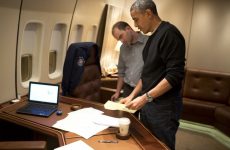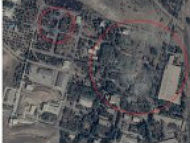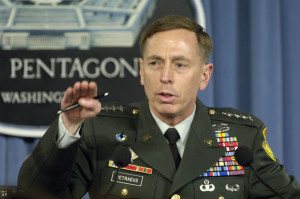
Now Gen (ret.) David Petraeus, an eminent American military leader, has joined a chorus of critics who have assessed President Barack Obama’s proposed nuclear deal with Iran. They are alarmed by what is emerging. Petraeus, a former CIA Director and Commander in Iraq, concurs with other former top administration officials who warn:
“The agreement will not prevent Iran from having a nuclear weapons capability. It will not require the dismantling of Iran’s nuclear infrastructure.”
This latest public protest has also been supported by no less than Robert Einhorn, a former member of the U.S. negotiating team with Iran; David Samore, an Obama adviser on nuclear policy who now leads an advocacy group called ‘United Against Nuclear Iran’; Dennis Ross; retired U.S. General David Cartwright; and Stephen Hadley, a national security adviser to former President George W. Bush. Former U.S. Secretaries of State Henry Kissinger and George Shultz have also voiced their objections, warning that it could lead to nuclear proliferation in the region.
“Iran’s nuclear program poses a direct threat to the entire region and constitutes a major source and incentive for nuclear proliferation across the Middle East, including Israel.”
Regional players are so worried about what Obama is doing that they have even opted for closer ties with Israel. In an interview with the British Newspaper, The Telepgraph, Saudi Arabia’s ambassador to the UK warned the current nuclear deal falls far short and must be ‘airtight’, otherwise all options would be on the table. In diplomatic jargon that means Riyadh would seek its own nuclear weapons, most likely off-the-shelf from Pakistan. Consider his statement:
Iran’s nuclear program poses a direct threat to the entire region and constitutes a major source and incentive for nuclear proliferation across the Middle East, including Israel.
Question: will this be Obama’s so-called foreign policy legacy – one that an official once compared to ‘Obamacare’ in the administration’s domestic policy? However, no matter what one thinks of Obamacare, the Iranian nuclear deal will not be heralded as ‘peace in our time’ across the Middle East. On the contrary, it will lead to nuclear chaos and eventual war. An American offer to bolster Israel and Iran’s other enemies with arms supplies or even a nuclear umbrella will not placate Iran’s neighbors.
And that is why Gen. Petraeus and other former top officials are speaking out before it is too late. Hopefully they will not prove to be ‘Cassandras’ for an American president who refuses to take No for an answer from Aytatollah Khamenei.
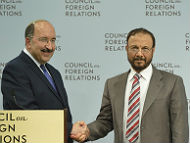
However, not only Saudi Arabia, but also Egypt is drawing closer to the Jewish state. This is also due to Cairo’s dismay and distrust of America’s rush to a perilous nuclear accord with Iran, a non-Arab enemy that is fomenting discord from one end of the Middle East to the other. Then there’s Turkey and the recent meeting of Israeli and Turkish officials that could auger a rapprochement.
Would you believe it? With the June 30th deadline fast approaching, Supreme Leader Ali Khamenei has even back-pedaled on his previous consent for ‘controlled inspections’ of suspected facilities by IAEA experts. The Iranian argument is that its ‘military bases’ must be off limits. In other words, they will not permit inspectors to enter Parchin, where nuclear weapons research is known to have been conducted. Couple this with Secretary Kerry’s drive for a deal that ignores Iran’s nuclear weapons program:
“We are not fixated on Iran specifically for what they did at one point or another.”
If Tehran has lied repeatedly about nuclear weapons research in the past this requires the unfettered inspection of all sites in the future.
Surely it follows that if Tehran has lied repeatedly about nuclear weapons research in the past this requires the unfettered inspection of all sites in the future. This is what worries not only Israel, but also Saudi Arabia, Egypt, the Gulf States, Jordan, and it can be assumed Turkey. Prime Minister Netanyahu voiced his concern:
“With the June 30th deadline the great powers may show a willingness for concessions to Iran.”
Israel’s leader added that the proposed deal is ‘inherently defective’ because (as Obama has admitted) it will enable Iran to develop nuclear weapons after ten years. Speaking at the graduation ceremony for the latest batch of Israeli Air Force pilots, Netanyahu said that no matter what happens the Jewish state will know how to defend herself. Incidentally, a female graduate won the award for outstanding combat navigator.
Why is Netanyahu racing for deal on offshore gas?
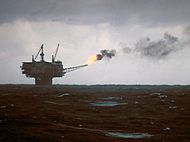
While President Obama is bent on a nuclear deal with Iran, Netanyahu also appears to be sprinting, maybe too quickly, for a gigantic deal to develop Israel’s offshore gas reserves. Israeli tycoon Yitzhak Tshuva and the American firm of Noble Energy have signed a monopolistic deal to develop the find estimated to be worth hundreds of millions of dollars. The gas find can solve Israel’s energy needs for decades to come while its export to Egypt and Jordan also has geo-strategic importance. However, there is a great debate raging over whether the state is getting a fair return in royalties.
Prof. David Gilo, the anti-cartel commissioner has resigned in protest over what he contends will be overpriced gas rates for Israeli consumers. Gilo and some other experts, as well as the opposition parties, charge that the gas monopoly will rip off Israeli consumers by charging over thirty-percent more than a reasonable profit. Netanyahu disagrees and has been pushing hard to get the deal approved by the government. However, Economics Minister Aryeh Derri has upset the applecart by refusing to take responsibility for over-ruling the cartel commissioner. The bottom line is the controversial gas accord has gone on hold and will have to be approved by the Knesset, where Netanyahu commands a bare one-seat majority.
To add fuel to the flames, so to speak, the Haaretz newspaper has carried a banner headline charging that American tycoon Sheldon Adelson, a big backer of Netanyahu, recently telephoned the PM urging him to expedite the gas deal. It is a very complicated issue that involves the possible dissolution of the gas monopoly in the future. It appears a decision will now rest with the Knesset, where it should be subject to a full-scale debate. This is what Netanyahu wanted to avoid. Maybe the PM Netanyahu has been too eager to push through the gas deal in order to reap the credit with voters the same way Obama wants to chalk up the nuclear deal with Iran. In any case, I am reminded of a saying by President Abraham Lincoln about tycoons and their motives:
“These capitalists generally act harmoniously and in concert to fleece the people.”
How would other states react to Hamas rocketing?
What more can be said about the UN Human Rights Council’s report on the war between Gaza and Israel last summer? This time it also accused Hamas of war crimes. Beyond that, Israel always gets special treatment by the UN body when she defends her civilians from thousands of rockets fired at them from Gaza. How would other democracies react in similar circumstances? I wish to draw on another comparison that may be pertinent. During the war in Iraq, Saddam Hussein was on the run. American intelligence had information that the Iraqi dictator was hiding in a high-rise apartment building in Baghdad. If they had warned the occupants to evacuate, Saddam Hussein would probably escape amid the fleeing residents. So they called in a massive air strike that leveled the building. Bulldozers had to sift through the rubble and bodies to look for Saddam Hussein. He wasn’t there. How many people were killed? To the best of my knowledge, no number was ever disclosed.
Bulldozers had to sift through the rubble and bodies to look for Saddam Hussein. He wasn’t there. How many people were killed? To the best of my knowledge, no number was ever disclosed.
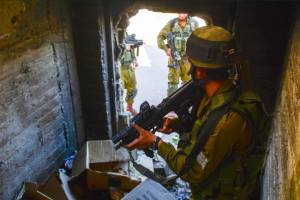
The occupants had not been forewarned with pamphlets dropped from the air, nor by a small ‘knock on the roof’ explosive charge, or even a telephone call warning them to get out within ten minutes or so. In Gaza, the IDF employed all these unique measures to reduce civilian casualties. There was never any UN enquiry into what happened in Baghdad or during the U.S. wars in Iraq, Afghanistan, or even Vietnam for that matter. One can go on and go about the Russians in Chechnya or even the Ukraine, or the Brits and the French in their former empires. My bottom line is that Israel is not stupid and knows she will always get the special treatment no other democracy does, and therefore takes special precautions to try and stay out of the hot seat. Of course things go wrong in warfare and there will always be some bad apples. So lets take the word of the commander of still the greatest democracy in the world. This is what Gen. Martin Dempsey, the Chairman of the Joint Chiefs of Staff had to say about the IDF operation to stop the rocketing from Gaza last summer:
“Israel went to extraordinary lengths to limit collateral damage and civilian casualties.”
Add to this a statement, not by UN appointed officials, but by an independent group of European and American senior commanders with actual combat experience. They found the IDF “took more measures last summer than any other army to protect the lives of the civilian population.”


